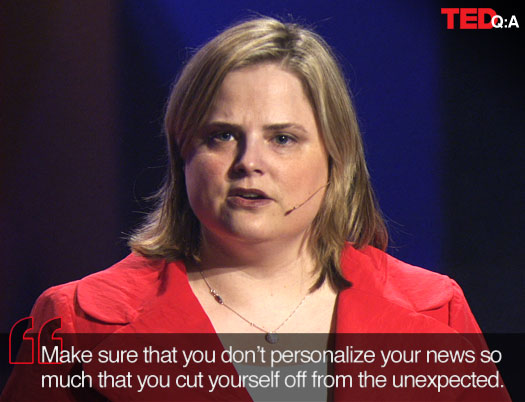Charlie Sheen. Weinergate. Obama’s birth certificate. If you think the stories major media outlets obsess about hit tawdry new lows each week, you’re not alone. But you don’t have to follow the industry into the abyss of banality. You can do something about it, starting with your daily media consumption choices. In her provocative new TED Book, Media Makeover: Improving The News One Click at a Time, Alisa Miller offers an entertaining and informative view of how “news” is made, what is missing from our news diets, why certain types of content are harder to come by, the implications for our society — and what can be done about it. Miller, CEO of Public Radio International, urges us to take control of the news we consume if we want a more accurate picture of the world. Media Makeover, which builds on Miller’s 2008 TEDTalk, is a must-read for anyone who wants to be better informed. We talked to her just as the book was being released.
Why does the news industry get such a bad rap? Is it justified? And is it simply the demands of a 24/7 news cycle?
In general, the news industry deserves criticism. It is not, however, that there isn’t excellent journalistic work happening each day; it can just be difficult to find. The news, in aggregate, is not providing an accurate picture of our world and is focused way too much on sensationalism –- the news equivalent of junk food. Part of this phenomenon is driven by a faster and faster news cycle, and that it is cheaper and more profitable to keep pumping sensational stories than to create other original news content. The net effect of the news agenda is that the public is trusting the news less and less. The good news is that research shows the public actually wants a more balanced diet of news. We dive deeper into all these issues in the book.
How does the news media reflect our perception of reality?
As the old adage says, the media is not great at telling us what to think, but it is stunningly good at telling you what to think about. Our perception of reality in our communities, our countries and our world is greatly influenced by the media. This is why taking control of our news diets is so important, so that we can more accurately see the world.
There is an old news-gathering idiom that ‘if it bleeds, it leads.’ Is that principle now crippling the industry?
‘If it bleeds, it leads’ is still very prevalent. And to be clear, some of these events are newsworthy. Violence and conflict is, after all, part of our world. The issue is that there is so much more to tell. News templates like ‘if it bleeds, it leads,’ and others like it, do not embrace a sense of discovery. And they foster a place where good news, surprise, authenticity and connection don’t seem part of what is newsworthy or how news could be told. These stories are also part of our world. There is great opportunity to satisfy and build on these needs.
The news media has an important agenda-setting role. How has that changed in recent years?
The news media’s agenda-setting role is just as powerful as it ever was. Although, now we are consuming news across all kinds of platforms 24/7, sources are more fragmented, and Americans are increasingly attracted to sources that espouse their own point of view. We also have the power of social media that can spread news: good, bad, accurate and not accurate, in seconds, to many more people. Our friends and family are becoming an even more important part of what and whose news agenda we are seeing … and believing.
You argue that we tune into news sources that support, rather than challenge, our beliefs. That’s comforting and natural for many people. Why should we change those habits?
It is only natural for us to be attracted to stories that we agree with. It makes us feel smart and safe. But if we only listen to one perspective, whatever that may be, we are likely living in news bubble that will not equip us to expand our understanding of the world and also could negatively impact the quality of the decisions we make for ourselves, our families and our communities.
What are the essential things a news consumer can do to widen and enhance their view of the world?
Be mindful of the sources you choose. Don’t assume that any one source, or even your current collection of sources, is giving you all you need. Given the growing list of tools and services available to us these days, you can curate and take other actions to improve our news. Make sure that you don’t personalize your news so much that you cut yourself off from the unexpected. More tips are in the book and at mediamakeover.org, where we will be collecting best practices, tools, and great ideas to help us navigate the world through news and great storytelling.
Media Makeover is part of the TED Books series, which is available for the Kindle and all platforms that use Kindle Reader apps.

Comments (3)
Pingback: 4. Media | 1♀PM CLUB
Pingback: TED Books | Emerging Technologies in Academic Libraries